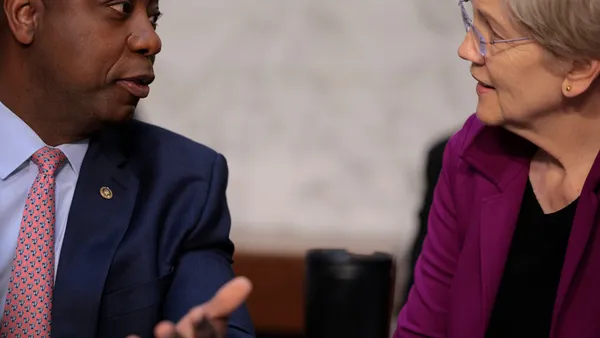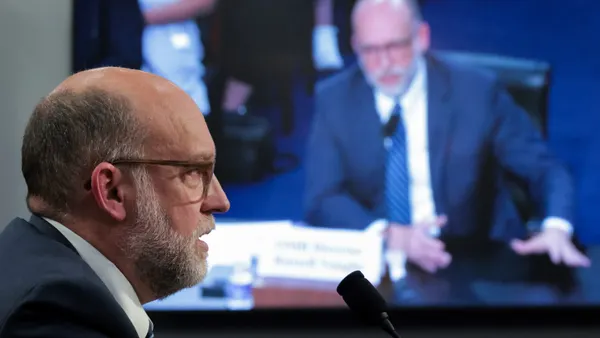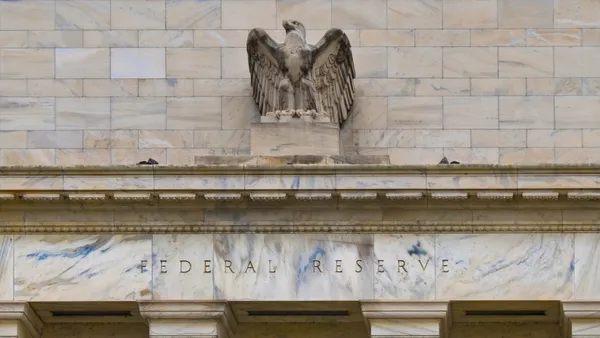Dive Brief:
- The Consumer Financial Protection Bureau (CFPB) terminated alternative lender Upstart’s no-action letter Wednesday, at the company’s request.
- “Upstart has requested termination because it would like to make time-sensitive model changes that are not possible if the CFPB were to conduct the appropriate level of monitoring and review,” the CFPB wrote in Wednesday’s order.
- Upstart’s move comes after the CFPB said last month it would de-emphasize its no-action letter policy and product development sandbox, which the bureau said “proved to be ineffective.”
Dive Insight:
The CFPB, since 2014, has allowed individual companies to apply for no-action letters shielding them from regulatory action while they develop specific products in a safe harbor. The truncation of Upstart’s no-action letter leaves the program without its longest-running participant — though participation was sparse.
Upstart, which uses artificial intelligence and alternative credit data such as a borrower’s education and job history as part of its formula to determine creditworthiness, became the first company to obtain a three-year CFPB no-action letter in 2017. The CFPB issued a second letter for a further three years in November 2020.
Upstart notified the CFPB in April, as the 2020 letter required, that it intended to add several new variables to its underwriting and pricing model. The CFPB, however, asked for more time to review and “rigorously evaluate the implications of the changes.”
The CFPB, the next month, established its Office of Competition and Innovation, which aimed to hold “incubation events” such as sprints, hackathons, tabletop exercises and war games to troubleshoot barriers to innovation — in place of forging innovation agreements such as no-action letters with individual companies.
Three days later, Upstart asked to shorten its no-action letter’s term to 18 months — effectively ending it immediately. (The request was dated May 27, the Friday before Memorial Day weekend. The 18-month period would end May 30, on the holiday.)
“Our request was motivated by a need to keep our risk models accurate and up-to-date during a period of significant economic change,” Nat Hoopes, Upstart’s vice president and head of regulatory affairs and public policy, said in a blog post Wednesday.
Hoopes said the company has been in contact with the CFPB’s new innovation office “and will continue to pursue a transparent and cooperative relationship with the CFPB and other financial regulators.”
In its order, the CFPB said Upstart “correctly identified” that its review “would prevent them from making quick business decisions with regard to its model.”
Upstart’s relationship with the CFPB appeared fruitful. The alternative data model the company developed helped it approve 27% more loans — with an annual percentage rate averaging 16% lower — during the first two years of its no-action letter period, Upstart reported in 2019.
“We designed our fair lending program to meet or exceed the CFPB’s high standards for compliance under the Equal Credit Opportunity Act (ECOA). The process and rigor has made us a better company,” Hoopes wrote in Wednesday’s blog post. “We appreciate the time, attention and thought devoted by the Bureau’s staff to the Upstart [no-action letter] over the past six years.”
The CFPB, in its order, however, took care to note the bureau “has never endorsed Upstart’s model.”
“There is a risk that the public could misconstrue the [no-action letter] to suggest that the CFPB concluded Upstart’s model complies with the ECOA,” the bureau wrote in its order, adding that such an assessment would require more analysis.
Upstart, meanwhile, said it would “continue to rigorously test every loan application for fairness, including pre-testing every model update prior to implementation.”
“Effective cooperation between the government and financial technology innovators remains critical to improving financial access for the millions of borrowers left behind by America’s current credit system,” Hoopes wrote Wednesday.













